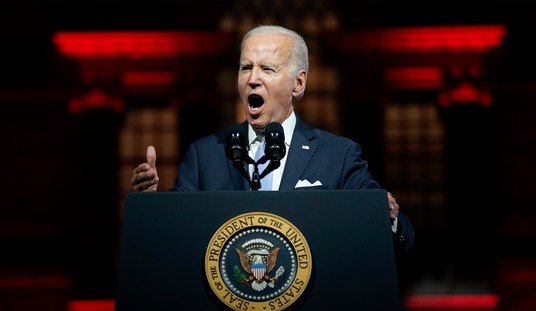High-profile Republican activist Grover Norquist recently bucked his party by supporting the Ground Zero mosque and now he’s picked another fight: the war in Afghanistan. He denies that he’s calling for a rapid withdrawal of U.S. forces and just says he’s calling for a “discussion” of it — which basically means he just doesn’t have the testicular fortitude to say that’s his position.
Norquist said that conservatives should take a look at the “vast expenditures of cash, the vast expenditures of other people lives, and the opportunity cost.” He says, “It seems to me that it has been more expensive than not. And it has made America weaker than otherwise.” He also mentioned how President Reagan “didn’t decide to fix Lebanon” but packed up and left after the bombing of the Marine barracks. But don’t get Norquist wrong, he insists. He isn’t calling for doing the same in Afghanistan, even though he’s making the case for it.
He is the Republican equivalent of those Democrats who tried to force President Bush into withdrawing from Iraq before the surge was even given a chance to succeed. Just as the surge is bringing about signs of progress in Afghanistan and 1,400 more Marines are being sent, Norquist wants to turn and run.
At a private meeting on January 19, General Petraeus reacted to the briefing given to him by saying, “We’ve got our teeth in the enemy’s jugular now, and we’re not going to let go.” When Petraeus talks like that, it means something. He is not a man known for using bravado and is measured and cautious in his assessments.
A recent poll shows that the Afghans who live where the surge is most focused are seeing improvements. Sixty-seven percent of those in Helmand province said their security is “good,” up from 14 percent in December 2009, and almost two-thirds say their country is headed in the right direction. The Afghan population remains quite pro-American. A poll in early 2010 found that 68 percent of Afghans view the U.S. military presence positively, almost as many support the surge, and a slight majority express a positive view of the U.S. The Taliban, on the other hand, is viewed by almost 70 percent of Afghans as their number one threat.
The U.S. military and the Afghan government are making progress in trying to replicate the Sons of Iraq. The governor of Kandahar has traveled to areas previously under Taliban control to hold meetings with 350 elders and General Petraeus is setting up “community watch[es] with AK-47s” in 68 districts. One of the largest Pashtun tribes allied with the Afghan government in January, and the largest tribe in the southern part of Helmand province, has done the same. Combat forces are now in the community instead of sheltered in large bases and are developing relationships on the grassroots level. Intercepted communications show the Taliban has low morale and some are defecting.
Norquist may genuinely feel that the war isn’t worth the cost even if the surge is working, though I’d like him to explain how abandoning the country to the Taliban, al-Qaeda, and other terrorists is a cost-saving measure over the long-term. He may just be a political opportunist and feel the Republican Party would benefit from turning against a war on which public opinion is turning increasingly sour. Or maybe the reason lies in Norquist’s ties to the Muslim Brotherhood.
Norquist is the man most responsible for giving the Brotherhood-tied organizations influence in the Bush administration. In 1998, he founded the Islamic Free Market Institute with money from Abdulrahman Alamoudi, a Brotherhood member who publicly praised Hamas and Hezbollah and was later convicted on terrorism-related charges. Norquist’s Institute also was created with money from a group identified as a Brotherhood front called the International Institute of Islamic Thought.
A lot of attention has been brought to Suhail Khan, a close friend of Norquist’s who became an official in the Bush administration. New videos have surfaced of Khan from 1999 where he spoke in support of the “mujahideen” that die “for the cause of Islam.” He said Muslims are commanded by Allah to “protect our brothers and sisters” in places like Bosnia, Kashmir, Iraq, and Palestine and claimed that in the U.S., Muslims face “outright hatred” and that “mosques are burned. Islamic centers are vandalized, desecrated.” And he admired how “early Muslims loved death, dying for the sake of almighty Allah, more than the oppressors of Muslims loved life.”
Norquist is almost certainly a convert to Islam, which helps explain his affection for these groups and individuals. His wife is a devout Muslim and they have adopted a Palestinian child. When Paul Sperry asked Norquist if he had converted to Islam, all he would say is that it is “personal.”
He timed his call for a “discussion” of a withdrawal well, hoping to create a fissure in the Republican ranks as candidates for the presidency and Congress are forced to defend an unpopular position. The Taliban will launch its offensives in the spring and as with the surge in Iraq, things will have to become bloodier before they can become better. The death toll will rise and so will the deficit, making the war a tempting target for political points.
The Taliban, al-Qaeda, and other terrorists used Afghanistan as a launching pad for attacks on the West. There is no reason to believe that they wouldn’t do the same again. This is a fight that must be won.








Join the conversation as a VIP Member